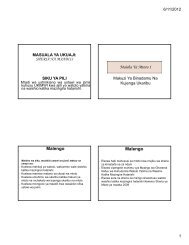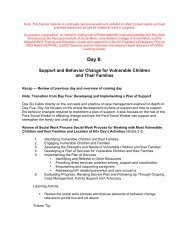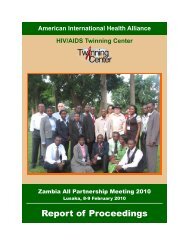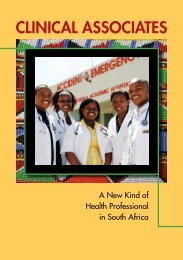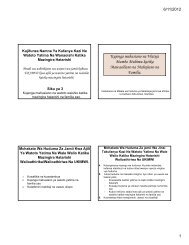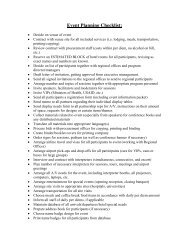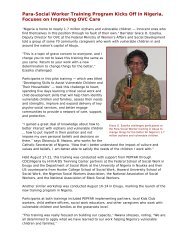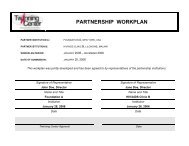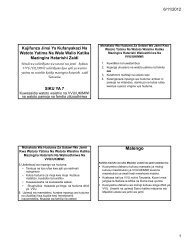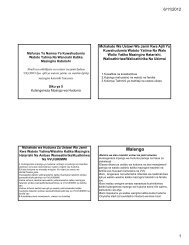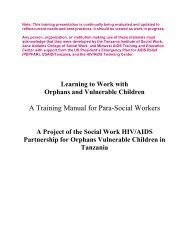Mobilizing Diaspora Volunteers for Public Health Capacity Building
Mobilizing Diaspora Volunteers for Public Health Capacity Building
Mobilizing Diaspora Volunteers for Public Health Capacity Building
You also want an ePaper? Increase the reach of your titles
YUMPU automatically turns print PDFs into web optimized ePapers that Google loves.
embassies or consulates can also serve a similar function as intermediaries although where the diaspora<br />
is politicized or where a diaspora has little confidence in the country of origin government, partnership<br />
with diplomats can be counterproductive.<br />
In the case of the EDVP, interviews were a critical mechanism to understand the motivations and level of<br />
commitment of prospective volunteers and, the authors suspect, had enormous consequences <strong>for</strong> the<br />
success of volunteer missions. Indeed, to date, no volunteer has dropped out or prematurely left the<br />
program. Detailed interviews allowed the program coordinators to screen applicants and to manage<br />
volunteers’ expectations.<br />
5. Even diaspora volunteers require orientation and careful attention to managing<br />
expectations can lead to more positive volunteer missions.<br />
It has often been argued that diaspora volunteers do not require cultural orientation since they are<br />
typically familiar with their countries of origin. The experience of EDVP suggests otherwise. <strong>Diaspora</strong><br />
volunteers return to a country that has often changed substantially from the country they left, and the<br />
volunteers themselves have also often changed during their tenure abroad. Local workers view<br />
diasporas ambivalently, sometimes recognizing their achievements while being skeptical of their<br />
expertise at other times. Indeed, diasporas often assume the workplace culture of the societies where<br />
they reside rather than the societies where they originate. If diaspora volunteers are cautious and<br />
diplomatic, their capacity to intermediate between the two cultures can catalyze a gradual cultural shift.<br />
Otherwise, they lack the outsider credibility of a non‐diaspora volunteer. These risks are best addressed<br />
during an orientation process.<br />
Similarly, diaspora volunteers often harbor outsized expectations regarding the impact or conditions of<br />
the volunteer mission, particularly accommodation, the level of supervision and transportation. Many<br />
have spent extended periods of time away from the country of origin or are unfamiliar with working<br />
conditions in the developing world. There is typically a narrow window of opportunity during which a<br />
professional can volunteer and programs face the constant risk of losing that energy or enthusiasm and<br />
generating cynicism. Un<strong>for</strong>tunately, there is no simple solution to this conundrum beyond managing the<br />
expectations of outgoing volunteers and ensuring that diaspora volunteers understand how their<br />
individual mission fits into a broader development strategy or diaspora engagement framework. This<br />
requires some degree of policy coordination and political buy‐in. In the case of the EDVP, the initiative<br />
currently benefits from the support of Ethiopia’s <strong>Health</strong> Minister and the United States’ continued<br />
commitment to HIV/AIDS prevention and treatment in the developing world.<br />
EDVP has addressed these challenges by providing <strong>for</strong>ums <strong>for</strong> diaspora volunteers to interact with each<br />
other and with experienced volunteers. For instance, the transition back to Ethiopia can be draining or<br />
isolating <strong>for</strong> some of the volunteers. Opportunities to share their experiences with other volunteers can<br />
help alleviate these personal stresses and deliberate ef<strong>for</strong>ts must be taken to create and sustain<br />
networks that allow volunteers to collaborate and provide peer‐to‐peer support. These ef<strong>for</strong>ts can range<br />
from email list serves, to periodic meetings, to connecting current volunteers with returned volunteer<br />
mentors. Small ef<strong>for</strong>ts – such as providing volunteers with official identification – can have a substantial<br />
impact on volunteers’ experience.<br />
6. Continuing to engage the volunteer after a mission ends is essential.<br />
<strong>Mobilizing</strong> <strong>Diaspora</strong> <strong>Volunteers</strong> <strong>for</strong> <strong>Public</strong> <strong>Health</strong> <strong>Capacity</strong> <strong>Building</strong> | 10



